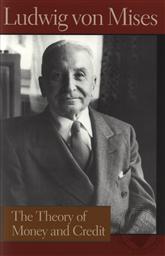The Theory of Money and Credit (5th Edition) (Book/ Paperback)
by Ludwig von MisesProduct Overview
Ludwig von Mises was the leading exponent of the Austrian School of economics throughout most of the twentieth century. He has long been regarded as a most knowledgeable and respected economist, even though his teachings were generally outside the mainstream. He wrote twenty-five books and hundreds of articles on human action, free markets, and political economy.
When Ludwig von Mises wrote The Theory of Money and Credit in 1912 at the age of thirty-one, the world of economic thought was full of contending monetary theories, none of which could be considered truly united, in the sense of being at once securely founded on economic reality and also properly incorporated into an analysis of the entire economic system.
This landmark book changed that for good. The Theory of Money and Credit integrated monetary theory into the main body of economic analysis for the first time, providing fresh, new insights into the nature of money and its role in the economy and bringing Mises into the front rank of European economists.
The Theory of Money and Credit also presented a new monetary theory of the trade cycle, which, under further development by Mises's student Nobel Laureate F. A. Hayek, came to challenge all previous trade-cycle theories.
Table of Contents
Foreword, by Murray N. Rothbard (1981) 13
Preface to the New Edition (1952) 17
Introduction, by Lionel Robbins (1934) 19
Preface to the English Edition (1934) 23
Preface to the Second German Edition (1924) 33
PART ONE
THE NATURE OF MONEY
Chapter 1 The Function of Money
1 The General Economic Conditions for the Use of Money 41
2 The Origin of Money 42
3 The "Secondary" Functions of Money 46
Chapter 2 On the Measurement of Value
1 The Immeasurability of Subjective Use-Values 51
2 Total Value 58
3 Money as a Price Index 61
Chapter 3 The Various Kinds of Money
1 Money and Money Substitutes 63
2 The Peculiarities of Money Substitutes 67
3 Commodity Money, Credit Money, and Fiat Money 73
4 The Commodity Money of Past and of the Present 76
Chapter 4 Money and the State
1 The Position of the State in the Market 83
2 The Legal Concept of Money 84
3 The Influence of the State on the Monetary System 87
Chapter 5 Money as an Economic Good
1 Money Neither a Production Good nor a Consumption Good 95
2 Money as Part of Private Capital 103
3 Money Not a Part of Social Capital 107
Chapter 6 The Enemies of Money
1 Money in the Socialist Community 109
2 Money Cranks 111
PART TWO
THE VALUE OF MONEY
Chapter 7 The Concept of the Value of Money
1 Subjective and Objective Factors in the Theory of the Value of Money 117
2 The Objective Exchange Value of Money 120
3 The Problems Involved in the Theory of the Value of Money 122
Chapter 8 The Determinants of the Objective Exchange Value, or Purchasing Power, of Money
(I) The Element of Continuity in the Objective Exchange Value of Money
1 The Dependence of the Subjective Valuation of Money on the Existence of Objective Exchange Value 129
2 The Necessity for a Value Independent of the Monetary Function Before an Object Can Serve as Money 131
3 The Significance of Preexisting Prices in the Determination of Market Exchange Ratios 133
4 The Applicability of the Marginal-Utility Theory to Money 136
5 "Monetary" and "Nonmonetary" Influences Affecting the Objective Exchange Value of Money 145
(II) Fluctuations in the Objective Exchange Value of Money Evoked by Changes in the Ratio Between the Supply of Money and the Demand for It
6 The Quantity Theory 146
7 The Stock of Money and the Demand for Money 153
8 The Consequences of an Increase in the Quantity of Money While the Demand for Money Remains Unchanged or Does Not Increase to the Same Extent 160
9 Criticism of Some Arguments Against the Quantity Theory 168
10 Further Applications of the Quantity Theory 174
(III) A Special Cause of Variations in the Objective Exchange Value of Money Arising from the Peculiarities of Indirect Exchange
11 "Dearness of Living" 177
12 Wagner's Theory: The
About the Author(s)
Ludwig von Mises
Ludwig Heinrich Edler von Mises (1881-1973) was an Austrian economist, philosopher, and classical liberal who was a prominent figure in the Austrian School of economic thought. Fearing a Nazi take-over of Europe, Mises emigrated to New York in 1940. He published his magnum opus Human Action in 1949. Mises had a significant influence on the Libertarian movement that developed in the United States in the mid-20th century.
List Price: $14.50
Our Price: $13.59
You Save:
$0.91(6%)
+ Free Shipping w/ $45 min. purchase
Category: Business & Economics
Format: Book (Paperback) (544)
Publisher: Liberty Fund Inc
Date Published: Jul 01, 1981
Language: English
ISBN: 9780913966716
SKU: LT-807
Dimensions: 6.00 x 9.00 x 1.50 (in)
Weight: 31.30 oz










